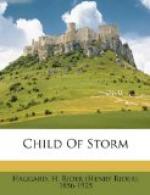“‘Wow!’ he said when he knew how the man had died. ’This lion’s cub is a wizard also, for how else could he have killed a soldier who has known war? Hold out his arms that I may finish him slowly.’
“So two of them held out my arms, and Bangu came up with his spear.”
Saduko ceased speaking, not that his tale was done, but because his voice choked in his throat. Indeed, seldom have I seen a man so moved. He breathed in great gasps, the sweat poured from him, and his muscles worked convulsively. I gave him a pannikin of water and he drank, then he went on:
“Already the spear had begun to prick—look, here is the mark of it”—and opening his kaross he pointed to a little white line just below the breast-bone—“when a strange shadow thrown by the fire of the burning huts came between Bangu and me, a shadow as that of a toad standing on its hind legs. I looked round and saw that it was the shadow of Zikali, whom I had seen once or twice. There he stood, though whence he came I know not, wagging his great white head that sits on the top of his body like a pumpkin on an ant-heap, rolling his big eyes and laughing loudly.
“‘A merry sight,’ he cried in his deep voice that sounded like water in a hollow cave. ’A merry sight, O Bangu, Chief of the Amakoba! Blood, blood, plenty of blood! Fire, fire, plenty of fire! Wizards dead here, there, and everywhere! Oh, a merry sight! I have seen many such; one at the kraal of your grandmother, for instance—your grandmother the great Inkosikazi, when myself I escaped with my life because I was so old; but never do I remember a merrier than that which this moon shines on,’ and he pointed to the White Lady who just then broke through the clouds. ’But, great Chief Bangu, lord loved by the son of Senzangakona, brother of the Black One (Chaka) who has ridden hence on the assegai, what is the meaning of this play?’ and he pointed to me and to the two soldiers who held out my little arms.
“‘I kill the wizard’s cub, Zikali, that is all,’ answered Bangu.
“‘I see, I see,’ laughed Zikali. ’A gallant deed! You have butchered the father and the mother, and now you would butcher the child who has slain one of your grown warriors in fair fight. A very gallant deed, well worthy of the chief of the Amakoba! Well, loose his spirit—only—’ He stopped and took a pinch of snuff from a box which he drew from a slit in the lobe of his great ear.
“‘Only what?’ asked Bangu, hesitating.
“’Only I wonder, Bangu, what you will think of the world in which you will find yourself before to-morrow’s moon arises. Come back thence and tell me, Bangu, for there are so many worlds beyond the sun, and I would learn for certain which of them such a one as you inhabits: a man who for hatred and for gain murders the father and the mother and then butchers the child—the child that could slay a warrior who has seen war—with the spear hot from his mother’s heart.’




